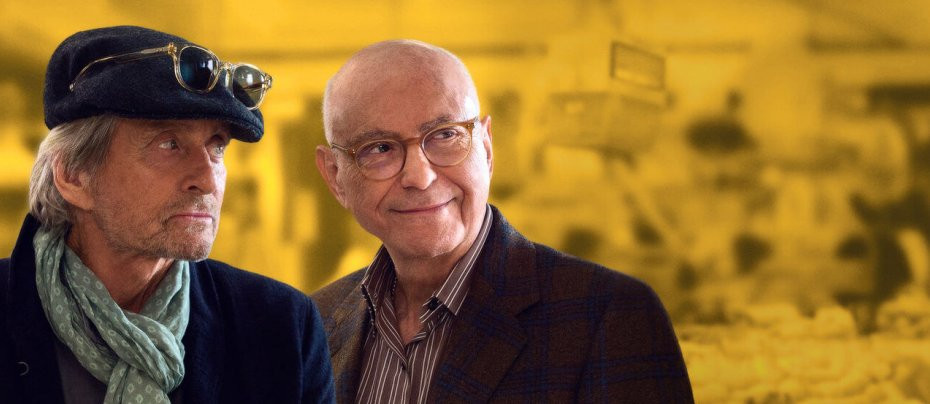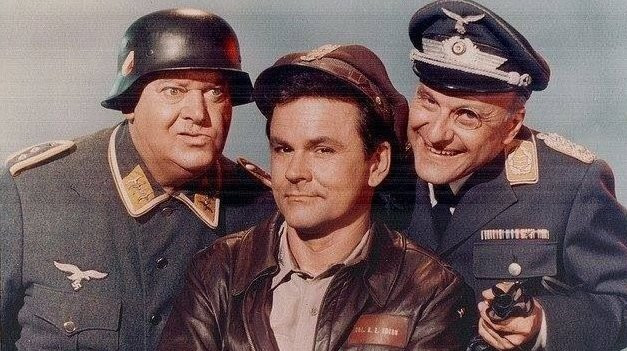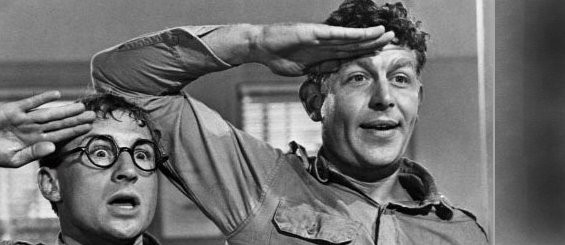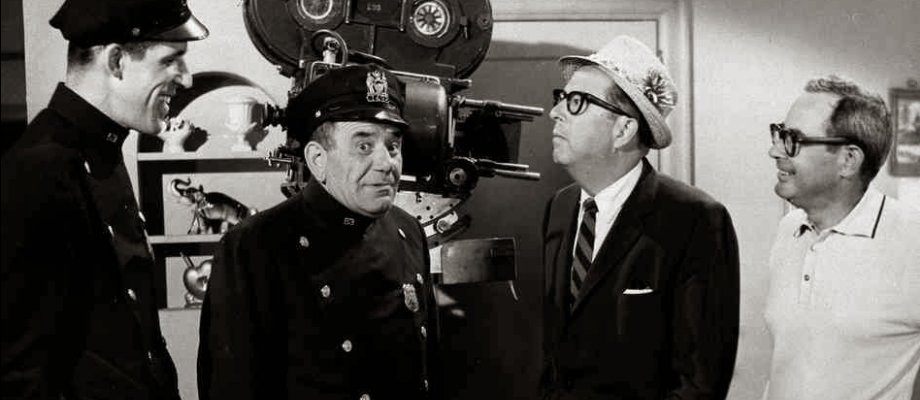
Nat Hiken
Nat Hiken was a pioneering American TV writer, producer, and songwriter who rose to prominence in the 1950s when he gave American television audiences probably their finest half hour series of comedies; The Phil Silvers Show. Hiken had a gift of economy with words that distinguished him from other writers. Many of the scriptwriters that he worked with would openly admit that Hiken could take what they had said in several sentences and put it across in just a few words, and those words would be funnier than they could ever have imagined. He also had a great eye for talent and is credited with discovering future stars such as Fred Gwynne, Alan Alda and Dick Van Dyke. He also had a talent that allowed him to find the right lines for the right people and in the process was able to draw strong comedic performances from such unlikely celebrities as boxer Rocky Graziano.
Nat Hiken was born on 23 June 1914 in Chicago in an area where many other Jewish immigrants had settled at that time. When he was six, Hiken’s parents moved to Milwaukee, Wisconsin. Nat, it would appear, inherited his father's sense of humour and by the age of eight father (Max) and son would perform a 'party piece' where Nat sat on Max's lap to perform a mock ventriloquist act. Nat did not enjoy the same sort of relationship with his mother, who by all accounts was a much more serious person whose great interest was in politics. Years later her own personal views almost resulted in Nat being blacklisted as a communist sympathiser.
By the time Nat Hiken was a teenager he had a reputation among his friends as a funny storyteller and something of a practical joker. Hiken would always try to find the humorous side of a situation even if it was, in a non-insulting way, at the expense of a friend or colleague. He did well at school and eventually enrolled at the University of Wisconsin in 1932 to study journalism. At University he joined the staff of the campus student newspaper known as the "The Daily Cardinal" and in his senior year he began to hone his humorous writing skills by writing a column called the "Gripers' Club," a send-up of newspaper advice columns.
After his graduation Hiken came up with an idea for a freelance news service which involved stories about local men and women who were now involved in the movie business in Hollywood. On the strength of this idea Hiken took a trip to California where a cousin of his had a number of contacts within the film industry. After meeting the manager of a local radio station Hiken adapted his "Gripers’ Club" column for the radio. The show was renamed "The Grouch Club" and went out six mornings a week from Monday to Saturday. It picked up a steady audience and by 1938 it was being broadcast throughout the state by the California Radio System.
"The Grouch Club" soon began to attract the attention of publications as prestigious as 'Variety' and very soon Warner Brothers took an interest too. The result of this was a series of short films. Finally, in April 1939, NBC broadcast the show coast to coast. The show had also caught the ear of Fred Allen, a popular radio comedian whose own show was considered one of the best and was certainly one of the most popular in an era where American radio was king. Allen hired Nat Hiken and co-writer Roland Kibbee to write for him, and in order to do so Hiken relocated to New York.
Around the same time Hiken's responsibilities on "The Fred Allen Show" increased and he was now pretty much Allen's head writer. But with the US entering the Second World War Hiken joined the US Air Force, where it was decided that he would be best put to work producing a morale boosting fund-raiser on Broadway. When the war came to an end Hiken decided that rather than continuing to write for Fred Allen, the time was right to branch out on his own. Steadily growing in confidence Hiken decided to go it alone and left Fred Allen in 1947. After leaving, Hiken was hired to write for the popular comedian Milton Berle who, as a very visual comedian, was struggling to find the right formula for a successful radio series. By this point, Berle had had six series on radio, all of which had ended in failure. But Nat Hiken found a winning formula for Berle, giving him his first truly successful radio series.
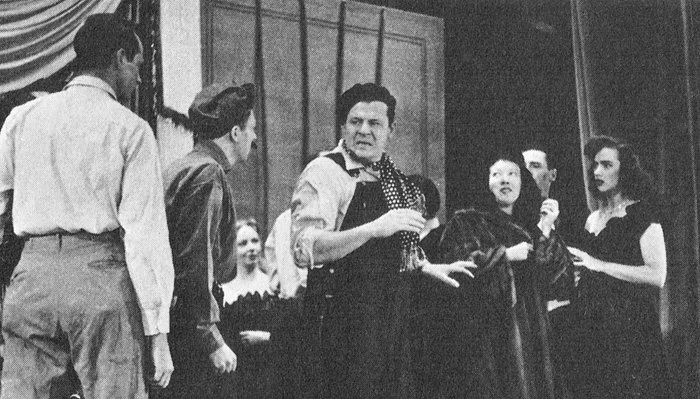
By that time television was gaining in popularity and although only about 135,000 televisions were in use the signs were there that this new medium was gaining ground so fast that there might come a time when it was more popular than radio. Hiken was still not convinced. But Milton Berle’s impact on television was now eclipsing anything else he did. By 1949, with Berle's television commitments taking precedence, the radio show was cancelled and Hiken had to weigh up his options. Those who predicted television's rising popularity were proved correct and by 1948 - 49 the number of TV sets in use had risen to half a million. Hiken's first television gig was an impressive one. He was hired as head writer on the staff of Four Star Revue, a new variety series developed by NBC. Hiken stamped his personality on the series by altering the format by crafting sketches that were all linked as opposed to being individual set-pieces. One critic remarked that the idea was "hardly wildly original" but "no one else has done it." Encouraged by the support he was getting Hiken decided to develop the concept to the next level.
However, in 1950, just as Hiken's career was taking off it almost came to a grinding halt. In June, his name appeared in a published report entitled 'Red Channels: the Report of Communist Influence in Radio and Television,' which set out to expose communist sympathisers working within the entertainment industry. Running at just over six pages and naming 151 entertainment and journalism professionals, 'Red Channels' exerted such a powerful influence on the broadcasting industry that it became the blacklisters bible. Although not a communist sympathiser himself, Nat Hiken knew that, by association, his mother's strong political beliefs could pull him into the widening net of those under suspicion. Regardless of whether or not you were innocent - industry bosses only had to think you were guilty for you to become blacklisted. In the end Hiken had to take out an advertisement in Variety denouncing any communist beliefs. Fortunately, it did the trick.
Relieved at being able to continue working professionally, Hiken decided to develop his sitcom concept to the next level for a comic he regarded as having huge potential; Martha Raye.
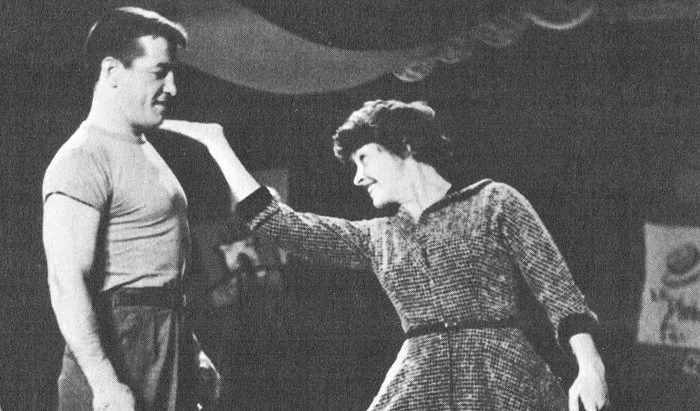
Raye had been on the verge of a breakthrough into stardom for many years but had never managed to cross the last hurdle. What Hiken did was create a character for her as a frustrated, man-hungry spinster and put her into a situation comedy setting. The show was an immediate hit and was the talking point of the 1951-52 season. But before that season came to an end Hiken was worried that some of the scripts were not strong enough. The solution was the boxer Rocky Graziano! After getting to know the championship boxer, Hiken got the idea that he could use him in The Martha Raye Show. From Graziano's point of view his days in the ring were numbered and he needed another way to make a living. Hiken put Graziano into the show and although his delivery was stiff and awkward Hiken wrote his part in such a way that this type of delivery actually became an asset, and what's more there was an instant chemistry between the boxer and the star. The critics raved about the second season premiere of "The Martha Raye Show," the first TV programme to be written and directed by Nat Hiken.
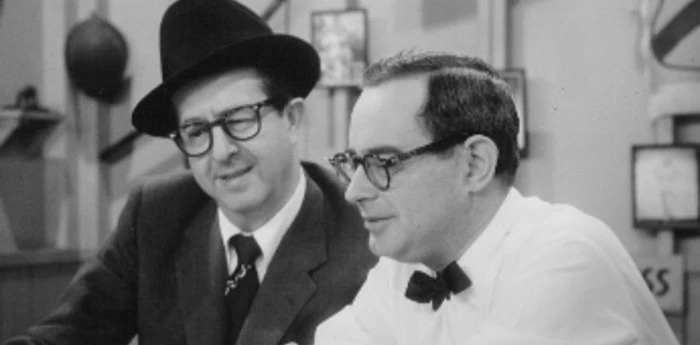
During this period Hiken used to 'get away from it all' by playing cards at the Park Plaza Hotel where he would meet up with other showbiz types which included an up-and-coming Broadway star by the name of Phil Silvers. Part of the enjoyment of the game for Hiken was the banter that went on between the players, not least of all Silvers who was one of the most vocal and entertaining of the participants with his quick-witted ad-libs and his own little nuances. But at this stage of his career Silvers was no more than a bit-part player who managed to pick up occasional roles in movies whenever a smart talking wise guy was required. Hollywood did not see him as a star. But in February 1954, a gig at Washington's Mayflower Hotel got him noticed by Hubbell Robinson, vice president of programming at CBS. Seeing something special in Silvers, Robinson decided to get Nat Hiken to create a TV show for him. Hiken only knew Silvers casually up to that point, mainly from the card games they had played, but knew enough about him to get the feel of his character. Even so, it was several months before they decided on an idea. Initially, Hiken wanted to cast Silvers as a finagling army sergeant, but Silvers didn't like the idea. He thought they could come up with something much better. By the time they were ready to meet up with Robinson again they had come up with a number of possibilities for a series. One included Silvers as a minor league baseball manager, one as a conniving stockbroker and one as the manager of a gym. Robinson liked the army idea.
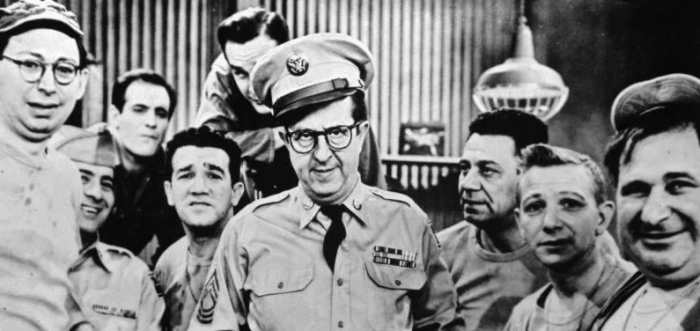
The cunning, work-shy Ernest Bilko ran the Motor Pool at Fort Baxter, Kansas - and arguably most of the camp. The master of the money-making scam, the smart-talking, quick witted sergeant would bet on anything and everything whilst keeping an eagle-eye open for his next fortune-making opportunity, be it at the expense of some poor unfortunate, or a talented individual who would be temporarily assigned to his platoon. For supporting characters Hiken handpicked the cast himself. Billy Sands had been a stalwart of the "Berle" show; Herbie Faye and Jimmy Little were bit-part players from The Martha Raye Show, while Bilko's sidekicks Harry Lembeck and Allan Melvin were from Billy Wilder’s 1953 comedy movie Stalag 17. Harry Clark played mess sergeant Stanley Sowici and Paul Ford became Bilko's beleaguered commander Colonel Hall. However, Maurice Gosfield came out of nowhere.
When Maurice Gosfield walked into the casting room one day Hiken knew immediately that he had found a slob who fitted the bill beyond his wildest dreams. Duane Doberman was an oversized, ugly, talentless individual, who -according to Silvers himself, Gosfield fit in every department. A pilot was shot for Robinson and his boss William Paley who immediately ordered 39 episodes with both Hiken and Silvers given a percentage of the series.
Under the title You'll Never Get Rich, the show premiered on 20 September 1955 but to Silvers' and Hiken's horror it was put up against an NBC comedy that featured Martha Raye, Bob Hope and Milton Berle. Naturally for an unknown series going up against such heavyweights the ratings were poor that first week and showed little sign of improvement as the weeks rolled into a month. The Network decided to move the time slot and managed to get the platoon a spot on the prestigious Ed Sullivan Show. Critics also began to take notice. Jack Gould of the 'New York Times' wrote 'A set owner would have to search the channels far and wide for a more polished example of expert farce.' Week by week the ratings grew for the series, which was now renamed The Phil Silvers Show, after the growing popularity of the star, and soon became a smash hit.
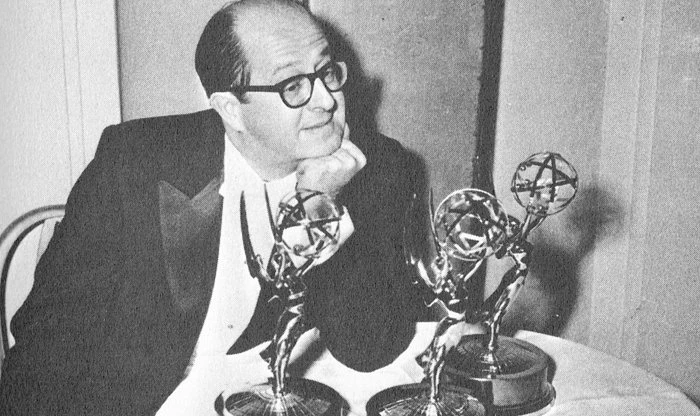
In 1955 the series won five awards bestowed on it by the Academy of Television Arts and Sciences. It was still in its first season, but the strain of keeping it constantly funny was already beginning to take its toll on Nat Hiken.
Hiken’s working day normally began at six in the morning when he arrived at his office and he wrote until he was needed on set, sometimes rewriting a scene at the last minute just before the cast went in front of the cameras. Sometimes he’d even feed a character a new line just as he was about to take his place in front of the camera. Hiken also relied on the quick-witted Phil Silvers to ad-lib at the appropriate time if, for instance, something unexpected would happen. The best example of this is probably the episode ‘Court Martial’, where the Army had inadvertently inducted a chimpanzee into Bilko’s platoon. The only way out of the mess was to court-martial the animal with, naturally enough, Bilko acting as the poor creature’s defence. While filming the scene the chimp suddenly and unexpectedly walked to the back of the stage where he picked up a telephone. Without missing a beat Silvers turned to the court and said, “Just a minute, sir, I think he’s calling for another lawyer.” Not only did it save the scene, but it also gave the series another of its truly golden moments.
However, the responsibility of The Phil Silvers Show soon began to have an effect on Hiken’s mental health. When the show was in production his friends and relatives noticed an intensity in him that he didn’t have before the show’s success. He would often wake up in the middle of the night in a cold sweat knowing that so many people relied on him to come up with the next plot idea. Eventually the stress of running the series proved too much and following some minor ailments which kept him from writing and from the set, it was agreed that the first series would end at episode thirty-four rather than episode thirty-nine as planned. Hiken also decided that he would leave the series as soon as he could find a suitable replacement, but it wasn’t until towards the end of the second season that he bought in Leonard Stern as his successor. Stern had just left The Honeymooners another hit comedy series at the time and came with a good pedigree. However, Hiken was soon rewriting Stern’s scripts. At first Stern was, naturally enough, put out. But on reading the scripts he found that he was, to use his own words, ‘humbled’ by what he saw. “Where you would have a line that would be satisfactory, (Nat) would find one that was perfect for the moment.” Despite the admiration Stern came to develop for Hiken he decided to take another job.
Hiken now turned to Billy Friedberg who, having worked with him before, came with the advantage of knowing all Hiken’s little idiosyncrasies. At the same time that Hiken was having problems so was Phil Silvers. The star’s compulsive gambling had got completely out of control and led him into terrible debt. As a last resort he sold his partial ownership of the show, against Hiken’s advice. With the strain growing too much for Hiken in May 1957 an official announcement was made that he was leaving the series to ‘take a rest for reasons of health.’ By now The Phil Silvers Show had accumulated no less than seven Emmy Awards. But Nat Hiken walked away from it. The series continued for two more seasons without him. By the fourth season the show’s ratings began to slip enough for CBS to cancel it.
Having taken a break, Hiken busied himself in 1959 on four CBS specials: The Ballad of Louie the Louse, The Slowest Gun in the West, Summer In New York and Just Polly and Me. The first of these was another vehicle for Phil Silvers in which he played a character very much like Bilko, except Louie didn’t have any endearing qualities. He was a loan shark who mercilessly bled his clients dry. One of Louie’s debtors, Paul Barton, is so unhappily desperate that one night he finds himself praying to the heavens that he wished Louie would die in a plane crash. Waking up the next morning he discovers that his wish has come true. Wracked with guilt Barton writes a glowing tribute to Louie that makes him out to be something of a saint and soon turns him into a national treasure. Barton is invited to Hollywood to make a movie of Louie’s life and becomes a star himself. But his success is threatened when Louie is found alive and well having survived the crash. Barton must now hide Louie’s true personality from the rest of the world.
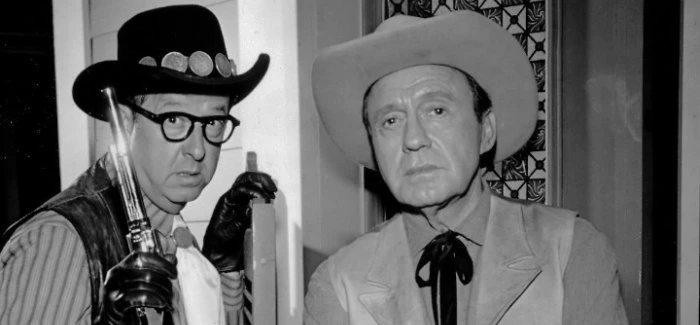
For The Slowest Gun in the West Hiken teamed Silvers with Jack Benny. The story was about Fletcher Bissell III (Silvers) aka ‘The Silver Dollar Kid,’ a sheriff who was so cowardly that no self-respecting gunslinger would shoot him for fear or ruining his own reputation. Eventually they find a man who is as cowardly as the Kid, Chicken Finsterwald (Benny), who once shot an eighty-four-year-old woman in the back and then ran out of town when the lady recovered and went looking for him. The other outlaws talk Finsterwald into disposing of the Kid convincing him that here was a gunman that even he could beat. But whilst shooting the CBS specials Hiken’s relationship with Silvers began to break down. The partnership was put under further pressure when Silvers told a reporter “He (Hiken) would be nothing without me. That’s why he always comes crawling back.” Silvers added that he was ‘only joking, of course,’ but the remark was not well received by Hiken. When the final special was shot in 1960 Phil Silvers and Nat Hiken went their separate ways.
In 1958 Hiken made a TV special called The Friars Club Man of the Hour. In the show fellow performers and comedians verbally decimated guest of honour Ed Sullivan. It was all done in the best possible taste, but it had an edge to it that had the audience, other guests-and most of all Sullivan himself in fits of uproarious laughter. But CBS were uncomfortable with the style of the show and when they failed to find a sponsor willing to take a chance on it there were no more made. It would be over a decade before Dean Martin’s Celebrity Roast appeared on television and became a smash hit and in the process revived Martin’s dwindling TV ratings.
By 1960 Nat Hiken found himself without regular TV work. Determined to make another impact with a long running TV series - and this time through his own production company, he hit on an idea of a series that revolved around a couple of New York cops. He knew the idea offered more comedic possibilities concentrating on the everyday lives and personal concerns of the cops with the crooks only providing a lesser (although still comedic) concern.
For casting the new series Hiken originally wanted Mickey Shaunessey as patrolman Francis Muldoon and Jack Warden as Gunther Toody. But when he failed to reach an agreement on fees with the actors he went back to ‘Bilko’ for actors he had worked with before. Fred Gwynne, who was cast as Muldoon had appeared in two ‘Bilko’ episodes, and the part of Toody went to Joe E. Ross who had starred in ‘Bilko’ as the regular character Mess Sergeant Rupert Ritzik, a comic foil to Bilko who often ended up the target of his scams. Other ‘Bilko’ veterans were also employed as both regular and guest characters.
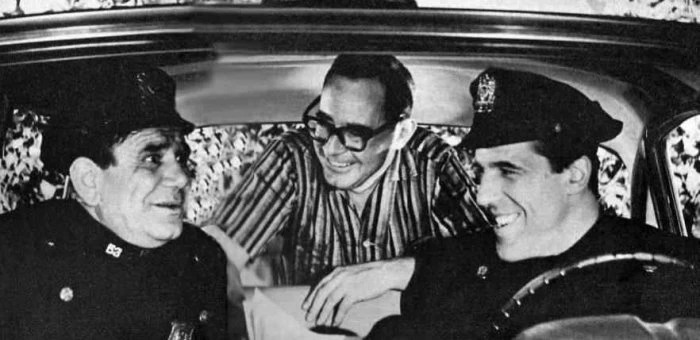
Car 54, Where Are You? hit the screens in 1961 and like ‘Bilko’ before it only found a relatively small audience. But as the weeks progressed and critics began enthusing over it that audience grew much larger. Viewers also took to two other stars in the series, Al Lewis as patrolman Leo Schnauser and his on-screen wife, Sylvia, played by Charlotte Rae. As their popularity grew Hiken began broadening their characters and for many fans their often-explosive relationship proved one of the highlights of the series. But behind the scenes the production was beset with problems.
The first problem was Joe E. Ross. Never considered by Nat Hiken as one of the most gifted of actors, Ross was in the series because, like Maurice Gossfield as Doberman, he looked and sounded perfect for the part. But Gossfield began to get delusions of grandeur and as more and more Doberman fan mail flooded into the CBS offices so Gosfield’s head began to swell. With Ross’ it was a case of history repeating itself. The warning signals on ‘Car 54’ came the day that Ross turned to Hiken on set whilst running through a script and said “Nat, I don’t think that’s so funny.” Soon after that Ross would turn up at the studio not having learned his lines and would get nasty with other stars of the show. On one occasion when his screen wife Beatrice Pons was taking a moment too long preparing for a scene, he turned to her and said, “I’m the star of this show and you’re wasting my time!”
There were other behind-the-scene problems, too. At the end of the first season director Al DeCaprio, who had worked with Hiken for four years on ‘Bilko’ decided he’d had enough and quit. Hiken also fell out with Billy Friedberg during the second season and fired him. Once again Hiken found the heavy workload and the responsibility of producing the show was too much for him. The pressure was affecting his ability to write. There was also pressure from the network. NBC wanted to replace the live laughter track with canned laughter, something Hiken resisted vehemently and he further resisted their requests to film the series in colour. The series was doing well in the ratings and was almost certain to be renewed for a third season when Nat Hiken pulled the plug on it. He had quite simply burned himself out.
By now, television production had moved away from New York and relocated to California. A modern purpose-built TV studio had been built in LA which gave it a distinct advantage over New York’s ad hoc array of converted theatres and radio stations. Nat Hiken had repeatedly refused to move away from New York pointing out that it was an essential training ground for young comedy writers where they could learn the finer points of their art. His fear that moving television production to the luxury of Los Angeles would take the ‘edge’ off comedy and it would soon become predictable and formulaic.
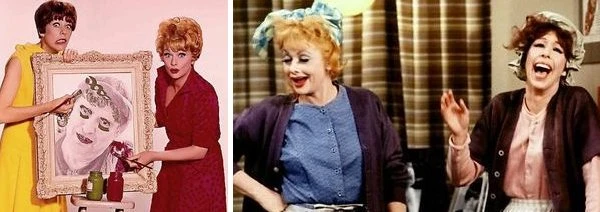
With no new show scheduled for the 1963-64 season, Hiken began developing a series for Al Lewis as a self-made business tycoon who returns to his working-class neighbourhood. When that didn’t work out, he shot a pilot episode of The Alan King Show but again nobody took up the option of a series. Over the next few years’ projects were embarked upon and projects fell through and it wasn’t until 1965 that he returned to television when Carol Burnett asked him to write a comedy special for her. Carol + 2 (the two being Lucille Ball and Zero Mostel) was a success and it became apparent to Hiken that the future of US television was now clearly rooted in California. He finally relented and moved to LA, but the move did little to improve his fortunes. He spent a lot of his time socialising and playing golf, but he grew ever more restless and ever more concerned about his professional and financial future. In 1968 Jule Styne approached Hiken with an idea for turning Louie the Louse into a Broadway musical. The prospect intrigued Hiken but before it got off the ground another more attractive offer came his way: A Hollywood movie. The Love God? was to star Don Knotts as a small-time publisher called Abner Peacock whose bird-watcher’s magazine is facing bankruptcy. In an effort to save it Peacock goes into business with a smut peddler called Osborn Tremain. Without Abner’s knowledge Tremain turns The Peacock into a girlie mag which lands his partner in court on obscenity charges.
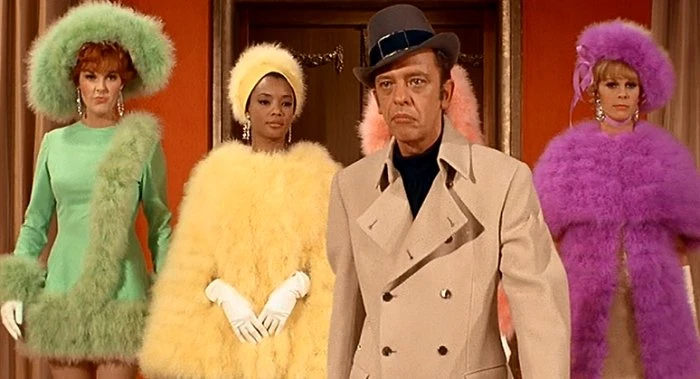
When Hiken delivered the script for The Love God? everyone concerned felt as though they had a hit on their hands. The studio was so impressed that they decided the part of Tremain should be offered to Dick Van Dyke who at this point in his career was at the height of his box-office appeal with both ‘Mary Poppins’ and ‘Chitty Chitty Bang Bang’ behind him. For some inexplicable reason though, he wasn’t offered the role. The part was offered instead to Phil Silvers whose career wasn’t progressing much better than Hiken’s. Even so, Silvers had to be persuaded to take the part. Hiken felt the part would have been perfect for Silvers and would have put him right back in the spotlight. But the day after agreeing to take the role Silvers did a complete u-turn and pulled out. Despite Hiken’s objections the studio cast Edmond O’Brien. Things went from bad to worse and Hiken tried desperately to salvage the production knowing all the time that his big film debut was going to be a disaster.
By December it was quite clear that Hiken was feeling the strain and once more his health began to suffer. On Saturday 7 December Nat Hiken, alone in a hotel room, suffered a massive heart attack and died. He was just 54 years of age.
In his introduction to his excellent 2001 biography of Nat Hiken (‘King of the Half Hour’), author David Everitt summed up Nat Hiken’s contribution to television history thus:
‘Nat Hiken’s story mirrors a brief, exciting period when inspired producers and writers, based primarily in New York, enjoyed the opportunity of shaping a new medium. He embodied early television’s finest qualities: independence and imagination, as well as a demand for the best and an appreciation of the melting-pot experience. These qualities also made it difficult, if not impossible, for him to adapt when the TV industry began to transform itself in the early 1960s: he remained independent at a time when networks sought control over their producers; he insisted on excellence and comic vision when mediocrity and homogeneous programming became the norm; and he was a compulsive, hands-on creator, attentive to his shows’ every detail, at a time of increasing specialisation.
For all his accomplishments, and for all the laughter and good cheer he orchestrated, Nat Hiken deserves to be rediscovered.’
Published on April 30th, 2019. Written by Marc Saul for Television Heaven.




